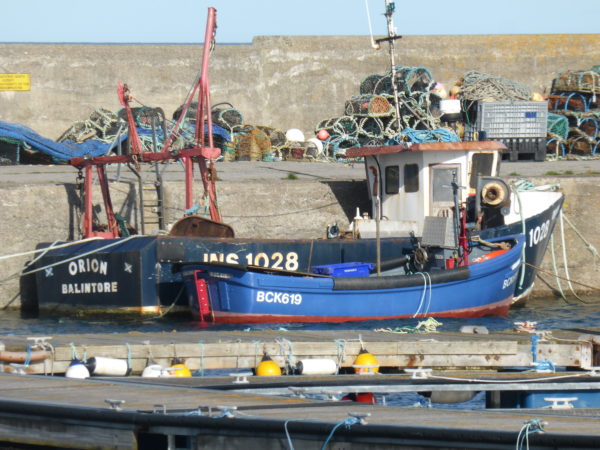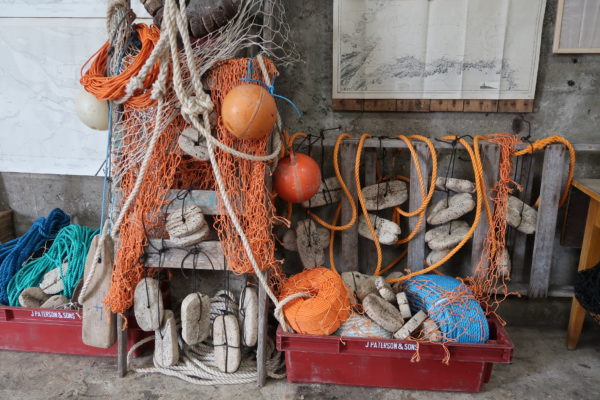
This month I’ve picked out a batch of Seaboard words connected to the shore, boats and fishing. (Thanks as usual to all the many contributors!) The vast majority are from Gaelic, as usual, even though local pronunciation often varies from that given in dictionaries. I haven’t been able to track down the roots of one or two, so any help with these would be appreciated. And I’m no expert on technical terms for boat parts etc, despite the best efforts of Bruce and Hugh, so please excuse (and correct) any inaccuracies! Please send any further contributions on this or any other subject to me, or just hand them in to the Hall.
Before I forget, I have also left in the Hall office a reference copy of a new booklet just published by Seòsamh Watson, the Irish professor who conducted interviews and research on Gaelic in the Villages over several years, especially with Bell Ann and Dolly. The booklet is called Boats, Bibles and Boyans, and is a collection of some of Seòsamh’s articles on the Seaboard, especially Gaelic-related. (Mìle taing to him for sending that on.) Do ask there if you’re interested in seeing it. A few people have their own copies, so would maybe lend them out. I don’t think the book is commercially available just now.
Shore
Cladach – coastline, shore
-mara – of the sea, of the tide (muir = sea), e.g. eun-mara – seabird; làn-mara – full/high tide; muc-mhara – a whale (sea pig!); maighdeann-mhara – mermaid.
Taigh na Mara – Sea House; Sùil na Mara – Eye of the Sea / gateway to the sea
Stralyach =stràilleach – pile of seaweed on the shore (pron. straw-lyach)
tungle – local pronunciation of Eng. /Scots Tangle, large edible seaweed with thick stalk and strap-like fronds
a porsht – a wee landing place. Gaelic: port, pron. porsht, a port or landing-place
gannach meen = gainmheach mìn, fine sand (pron. ganyach meen)
There’s a big suik on today – a big swell. Scots souk = suck, Gaelic sùghadh (soo-ugh)– a sucking, swell, the motion of the sea
Maighstir-cala – harbourmaster
Boat parts
Kennacracken / Ceann a’ chrataich – seat end support in boat (top end of curved beam running up inside side of boat under seat) G: ceann – head, top, end; cratach – back or side of a person.
Mash-crosh / mais-crois – footboard when rowing. G: maide-crois. maide – wood, stick, beam; crois – crutch or cross (match-eh-crosh)
Thaft – seat across coble ( G. tobhta, pron. approx.. tofta, Eng./Scots Taft or thaft = thwart, rower’s bench)
Jalup – pin for the oars. G: dealg – pin, wire, skewer (pron. jalluk)
Rollack – rowlock. G: rolag
Tallip – rowlock G: talb – protuberance; rowlock (pron. tallup)
Fishing
Pockan-mor = pocan-mara – the sea-bag, a cloth bag with the fisherman’s food for the trip.
Croick – a stand for a creel. Croich; gallows, cross
Dreichie – a small boat-anchor (no origin found)
Cleep /cleap / clape = Gaelic: clip (pron. cleep) – a hand-hook or gaffe for bringing in larger fish, lobsters or even a net.
Clye / clie – a creel, lobster-pot. Local pronunciation of Gaelic cliabh (clee-av)
Boicho the line – baiting . G: biathadh, pron. bee-ach-ugh or bee-ach-oo.
Raku the line– redd, clean, disentangle. Possibly from G: ràcadh – raking; or racadh, a variant of sracadh – ripping, cutting apart; or even rèitich – redding
Plàtach – rush mat for placing the line on while baiting etc. G: plàt – woven material from rushes or straw
Bothan, pron. bo-an or bo-han, a shed or bothy, e.g. for storing nets or for smoking fish.
Strachail, strachu – a jerk or tug, e.g. when a fish was on the line, or a pull or rip in a jumper or net. Probably from Gaelic: streachail – lacerate; sracadh – tear (pron. sdrach-ugh/oo)
Kaip /caib / ceap – spade for digging lug. G: caibe – spade, mattock
Biarst / bearst – a square frame round which a handline was wound. G: beairt, pron. byarsht – generally equipment or tackle, or a contraption, frame. Beairt-iasgaich – fishing tackle; beairt-fhighe – a loom.
Scountack / scountag – a (short?) fishing line. “Baiting the scountag”, “I’m going to put out the scountag”. No definite origin found so far but a very common Seaboard word. Possible connections to Gaelic sgann – membrane (skown); or busgainte – baited (boos-kantch-eh)
Did you catch anything? Nothing but the gorst! (i.e. no fish at all). G: gort, pron. gorsht – famine.
